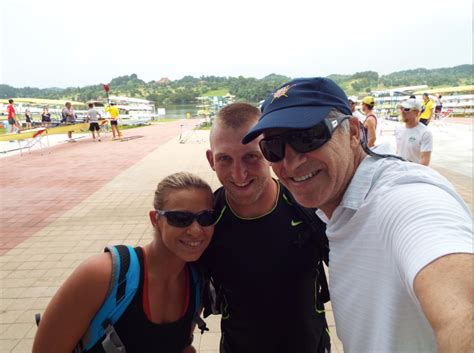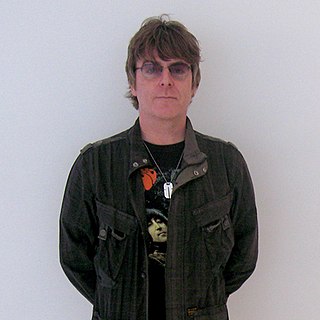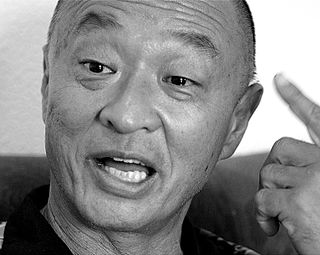A Quote by Gretel Ehrlich
Thirty years ago, my sister, Gale (so named because a gale hit Boston Harbor the night she was born), some friends and I stole a boat in the middle of the night and sailed it out of the Santa Barbara harbor. Suddenly we were becalmed and the current began pushing us toward the breakwall. With no running lights and no power, we were dead in the water. Out of that darkness a steel hull appeared: it was the local Coast Guard cutter. My father, stern-faced and displeased, stood in the bow.
Quote Topics
Appeared
Barbara
Because
Began
Boat
Born
Boston
Bow
Coast
Coast Guard
Current
Darkness
Dead
Faced
Father
Friends
Gale
Guard
Harbor
Hit
Hull
Lights
Local
Middle
Middle Of The Night
My Sister
Named
Night
Out
Power
Pushing
Running
Santa
Santa Barbara
She
Sister
Some
Steel
Stern
Stole
Stood
Suddenly
Thirty
Thirty Years
Toward
Us
Water
Were
Years
Years Ago
Related Quotes
Another boat, a straight-four, four sweep oarsmen without a coxswain, raced through our flotilla. I looked at them as they jetted past, and I quickly looked again. This boat appeared to be manned by four skeletons. Their cheek bones stood out like knots, their ribs were clearly defined as if they were painted on. Every leg and arm muscle showed as taut as steel cabling. Four pairs of deep-set eyes peered at us, conveying 'the look.' The four men who were rowing that shell were a special breed of oarsmen known as 'lightweights'.
I can't help comparing what I have with Gale to what I'm pretending to have with Peeta. How I never question Gale's motives while I do nothing but doubt the latter's. It's not a fair comparison really. Gale and I were thrown together by a mutual need to survive. Peeta and I know the other's survival means our own death. How do you sidestep that?
Suddenly she felt strong and happy. She was not afraid of the darkness or the fog and she knew with a singing in her heart that she would never fear them again. No matter what mists might curl around her in the future, she knew her refuge. She started briskly up the street toward home and the blocks seemed very long. Far, far too long. She caught up her skirts to her knees and began to run lightly. But this time she was not running from fear. She was running because Rhett's arms were at the end of the street.
What do I mean when I say I love Gale? I don't know. I did kiss him last night, in a moment when my emotions were running so high. But I'm sure he doesn't remember it. Does he? I hope not. If he does, everything will just get more complicated and I really can't think about kissing when I've got a rebellion to incite.
Emery cut in impatiantly, "For crying out loud. Who do you think you are, Nancy Drew?" Hey," I snapped, because no one sniped at my sister but me, and Mark echoed with a stern "Chill, dude." Phin was unperturbed. "Those books were highly unrealistic. Do you have any idea how much brain damage a person would have if she were hit on the head and drugged with chloroform that often?
The idea of social performance, that we're always performing identities, is something I got fairly obsessed with. I think it's probably because I am a person who went to 15 different elementary and middle schools. I moved all the time, often having to run out in the middle of the night because my mom couldn't pay the bills. There were schools where I'd be the poor loser kid. There were schools where I'd suddenly be the smart kid or the cool kid, although that was very seldom.
When we pulled out into the winter night and the real snow, our snow, began to stretch out beside us and twinkle against the windows, and the dim lights of small Wisconsin stations moved by, a sharp wild brace came suddenly into the air. That's my middle-west - not the wheat or the prairies or the lost Swede towns, but the thrilling returning trains of my youth and the street lamps and sleigh bells in the frosty dark and the shadows of holly wreaths thrown by lighted windows on the snow.
There was no moon but the night sky was a riot of crisp and glittering autumn stars. There were streetlights too and lights on buildings and on bridges which looked like earthbound stars and they glimmered repeated as they were reflected with the city in the night water of the Thames. It’s fairyland thought Richard.
In the time just before the bombing of Pearl Harbor, when Perfidia opens, we were pre-psychologized. There were no concepts of identity, no politics of victimization. Reparation wasn't in the language. Nobody thought about giving the great grandchildren of black slaves so much as $1.98. And all of a sudden the bombs hit, interventionism versus isolationism became a dead issue, and it was us-versus-them in a heartbeat.




































